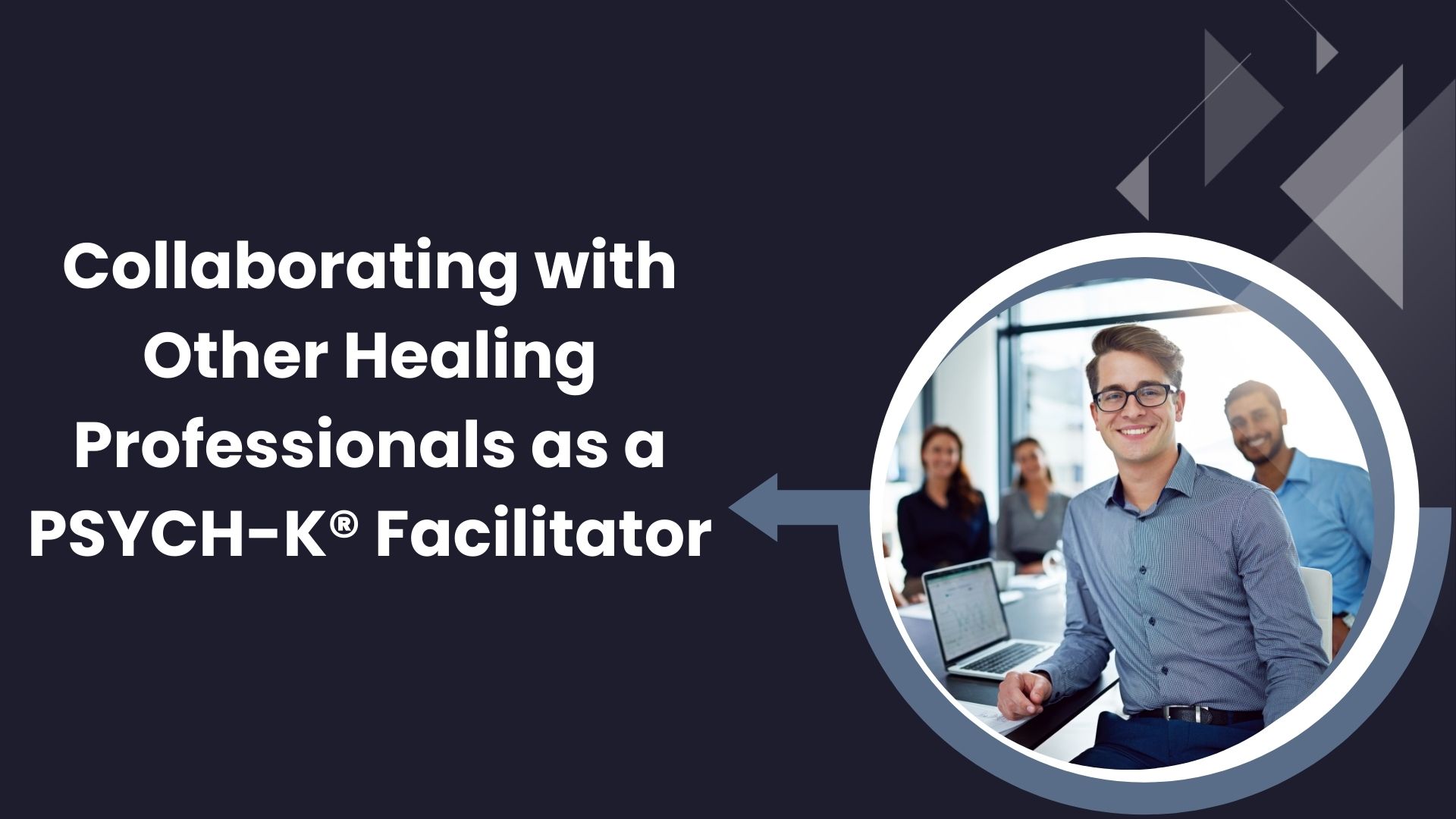In today’s holistic wellness landscape, collaboration among healing professionals is not only beneficial—it’s essential. For PSYCH-K® Facilitators, working with other practitioners such as therapists, coaches, naturopaths, chiropractors, and energy workers can expand client outcomes, strengthen professional networks, and elevate the transformational experience. By combining strengths across disciplines, Facilitators can offer clients a more integrative path to healing, one that honors the mind, body, and spirit.
This article explores the importance of collaboration, practical ways to build relationships with other professionals, and how to create a shared space of healing rooted in respect and purpose.
The Importance of Interdisciplinary Collaboration
PSYCH-K® is a unique process designed to transform subconscious beliefs that may be limiting personal potential. While incredibly effective on its own, PSYCH-K® can be even more powerful when integrated with complementary modalities. Collaboration allows for:
- Holistic Care: Clients receive comprehensive support addressing emotional, mental, physical, and energetic needs.
- Faster and Sustainable Results: PSYCH-K® can accelerate therapeutic progress, and when aligned with practices like somatic therapy, acupuncture, or nutritional counseling, results may be more profound and lasting.
- Mutual Professional Growth: Facilitators and other healers can learn from one another, gain insights into client challenges, and adopt new ways of approaching healing.
Who Can You Collaborate With?
As a PSYCH-K® Facilitator, you may find meaningful synergies with professionals such as:
- Psychotherapists and Counselors: While PSYCH-K® is not a replacement for therapy, it can support mental health by resolving subconscious conflicts. Therapists may refer clients for belief-change work as a complement to talk therapy.
- Life and Health Coaches: Coaches often help clients set goals; PSYCH-K® helps remove inner resistance that could sabotage progress.
- Naturopathic Doctors and Functional Medicine Practitioners: These professionals often explore the emotional and psychological roots of chronic conditions, where PSYCH-K® can be a powerful asset.
- Energy Healers (Reiki, EFT, etc.): Those who work with energy find PSYCH-K® aligns well with their understanding of consciousness and vibrational healing.
- Yoga Teachers and Somatic Therapists: These practitioners address the body-mind connection. PSYCH-K® can deepen awareness and create alignment at the subconscious level.
How to Approach Collaborative Relationships
Creating a network of trusted collaborators begins with clear communication and mutual respect. Here are steps to build meaningful professional alliances:
Educate Others About PSYCH-K®
Most professionals are unfamiliar with PSYCH-K® or may have only heard of it in passing. Prepare a concise explanation of what PSYCH-K® is, how it works, and what outcomes it can support. Offer literature, videos, or personal demonstrations.
Attend Interdisciplinary Events
Join wellness fairs, holistic health meetups, or online summits where various healing arts are represented. These gatherings are great for initiating conversations and forming connections.
Offer Joint Workshops or Webinars
Partnering with another practitioner for an event or webinar can be an effective way to showcase how your approaches complement each other. For example, a workshop titled “Unlocking Emotional Wellness: Combining PSYCH-K® and Somatic Healing” may attract a broader audience and lead to cross-referrals.
Exchange Sessions
Offer to trade sessions with a fellow practitioner. This allows both parties to experience the other’s modality firsthand, making referrals more informed and authentic.
Establish Clear Boundaries
Be clear about what PSYCH-K® is—and isn’t. It’s important not to position it as therapy or diagnosis. Clarifying your scope of practice fosters ethical collaboration and builds trust with professionals who hold licensure in other domains.
Success Stories from the Field
Many PSYCH-K® Facilitators have built thriving practices through collaboration. One example is a Facilitator who partners with a trauma-informed therapist. Clients do PSYCH-K® sessions to address subconscious beliefs, which then makes them more receptive to deeper therapeutic breakthroughs. Another Facilitator regularly receives referrals from a holistic dentist who understands the mind-body connection and values emotional clearing before certain procedures.
These stories demonstrate the ripple effect of collaboration: better outcomes for clients, wider recognition of PSYCH-K®, and sustainable professional growth.
Ethical Considerations
When working with other healing professionals, always:
- Obtain Informed Consent: Make sure clients understand the role and scope of PSYCH-K® in their healing journey.
- Respect Client Confidentiality: Share information with other practitioners only with explicit permission.
- Stay Within Your Training: Avoid offering advice or treatment in areas where you are not certified or qualified.
By maintaining high ethical standards, you contribute to a culture of integrity and professionalism that elevates all healing arts.
The Future of Healing Is Collaborative
As the demand for integrative wellness grows, PSYCH-K® Facilitators are uniquely positioned to be bridge-builders across modalities. By forming alliances rooted in mutual respect, shared vision, and a commitment to client well-being, you not only enhance your practice—you also contribute to a larger movement of conscious healing.
In a world that often compartmentalizes health, collaboration is revolutionary. And as a PSYCH-K® Facilitator, you are already part of that revolution.
Conclusion
Collaborating with other healing professionals isn’t just an opportunity—it’s a responsibility for those committed to holistic transformation. PSYCH-K Facilitators who embrace teamwork, expand their awareness of complementary practices, and engage in co-creative partnerships will find their impact multiplied, their knowledge enriched, and their clients better served.



